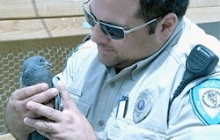When I was 19 years old some college friends and I discovered that one of our classmates was a sex offender. Being of "superior moral character" as we thought we were, we felt it was our duty to punish this student for what he had done. It didn't matter that he had served his time and been released. We felt justified in heaping all the humiliation, punishment and abuse we could on this already troubled young man.
Over a period of months my three friends and I took every opportunity we could find to abuse this individual. We printed fliers about him and his crimes, we spread gossip, we even physically assaulted him on a number of occasions. Even the faculty turned a blind eye to the abuse.
Shamefully, this behavior carried on until one day things went too far. While a group of us students were swimming in the pool, my friends and I decided to go after this young man under the auspices of "horseplay". By the end of this session of abuse, we had nearly drowned this young man. Sadly, none of the other students or faculty so much as lifted a finger to help the young man as he struggled for breath on the side of the pool.
This behavior would have continued if it wasn't for a certain professor pulling me aside one day.
"What this young man did in his past is horrible, isn't it?" he asked.
"Absolutely," I said. "Deplorable."
"And it is your desire to protect people from him, is it not?" he asked.
"Absolutely," I said, nodding my head.
"If your desire is to truly protect people, then you have to learn to love this young man. What you and your friends are doing now will only drive him deeper and deeper into the very place he feels most compelled to offend. If you are not careful, you may unknowingly contribute to his future behavior."
I had never thought about things that way before. I certainly didn't want to be responsible or an accomplice in any way to something horrible happening to someone. I never abused this young man again. And I never allowed my friends to do so either. In fact, we started to extend kindness to him. It was difficult at first, but there was a whole new kind of satisfaction that came from treating him differently. For the first time, we felt like we were really making a difference. We could see an immediate change in this young man. While he never said it, I could tell our kindness had given him hope.
It is that hope that will heal whatever ails the mind of that young man. It is that hope that will give him the strength to conquer the desire to make choices that will harm other people. It is that hope that will make him the one to protect other people from himself and his behaviors.
I am so thankful for the way that professor explained things to me. It changed my life. It helped me to see things so much differently.
So many of us get angry about injustices in our society... violent crime, sex offenses, abortions, elder abuse, animal abuse. The list seems never ending.
I can't tell you how many sweet and loving women have told me they would pick up a tire iron and beat someone half to death if they caught them abusing an animal. That is a completely natural feeling, but think about the chain of events that will follow that sort of action.
After you beat them half to death, who do you think they will retaliate against? Certainly not you; you have a tire iron.
That's right. They are going to retaliate against another helpless animal. And every time they feel powerless thinking about the day you beat them half to death, they will find some other poor animal to abuse as a way to medicate that feeling of powerlessness.
As advocates for animal rights, we have to discipline our feelings. We have to set our feelings aside. We have to be professional and productive about HOW we advocate the rights of animals.
Sometimes we think we might be helping a problem, while all the while we are doing things that only ensure the problem worsens.
The worth of a charitable organization must not be measured by the purity of its ideals. It must be measured by the quantifiable results of its actions against its stated mission.
How many rodeo hands held an electric prod a little longer on a bull because he was angry at the protestors outside his event that day? How many chicken farmers kicked an extra chicken for the PETA ad he saw in the paper that day?
The abuse of animals or people all come through years of subtle desensitization. But how do we increase that persons' sensitivity? How do we accomplish change?
Do we yell and scream at them? Do we try to hurt them financially? Do we try to shame them? Do we try to drown them in a swimming pool in college?
We befriend them. We love them.
This blog is designed to explore alternative strategies for change in organizations like PETA. It isn't about raising money, it isn't about a particular cause. It's about changing the way WE as animal rights advocates think about how to approach our goals to stop animal abuse.
I'm not interested in changing what people see. I'm interested in changing what people DO.
With your help and your open mind, I believe we can really accomplish our goals to stop animal abuse. I hope you will join me and share your thoughts about how we can better serve our mission.
Friday, March 12, 2010
Subscribe to:
Post Comments (Atom)

No comments:
Post a Comment